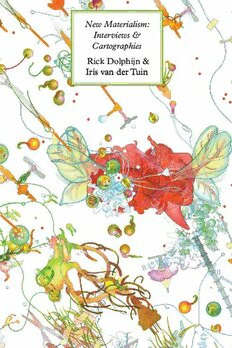
New Materialism: Interviews & Cartographies PDF
Preview New Materialism: Interviews & Cartographies
NNeeww MMaatteerriiaalliissmm:: IInntteerrvviieewwss && N e CCaarrttooggrraapphhiieess w M a te RRiicckk DDoollpphhiijjnn && r ia lis IIrriiss vvaann ddeerr TTuuiinn m : I n te r v ie w s & C a r to g r a p h ie s D o lp h ijn & v a n d e r T This book is the first monograph on the u in theme of ‘new materialism,’ an emerging trend in 21st century thought that has already left its mark in such fields as philosophy, cultural theory, feminism, science studies, and the arts. The first part of the book con- tains elaborate interviews with some of the most prominent new materialist scholars of today: Rosi Braidotti, Manuel DeLanda, Karen Barad, and Quentin Meillassoux. The second part situates the new materialist tra- dition in contemporary thought by singling out its transversal methodology, its position on sexual differing, and the ethical and political consequences of new materialism. OPEN HUMANITIES PRESS Cover design by Katherine Gillieson · Illustration by Tammy Lu New Materialism: Interviews & Cartographies New Metaphysics Series Editors: Graham Harman and Bruno Latour The world is due for a resurgence of original speculative metaphysics. The New Metaphys- ics series aims to provide a safe house for such thinking amidst the demoralizing caution and prudence of professional academic philosophy. We do not aim to bridge the analytic- continental divide, since we are equally impatient with nail-filing analytic critique and the continental reverence for dusty textual monuments. We favor instead the spirit of the intel- lectual gambler, and wish to discover and promote authors who meet this description. Like an emergent recording company, what we seek are traces of a new metaphysical ‘sound’ from any nation of the world. The editors are open to translations of neglected metaphysical classics, and will consider secondary works of especial force and daring. But our main inter- est is to stimulate the birth of disturbing masterpieces of twenty-first century philosophy. Rick Dolphijn and Iris van der Tuin New Materialism: Interviews & Cartographies OPEN HUMANITIES PRESS An imprint of MPublishing – University of Michigan Library, Ann Arbor, 2012 First edition published by Open Humanities Press Freely available online at http://hdl.handle.net/2027/spo.11515701.0001.001 Copyright © 2012 Rick Dolphijn and Iris van der Tuin and the respective authors This is an open access book, licensed under a Creative Commons By Attribution Share Alike license. Under this license, authors allow anyone to download, reuse, reprint, modify, distribute, and/or copy this book so long as the authors and source are cited and resulting derivative works are licensed under the same or similar license. No permission is required from the authors or the publisher. Statutory fair use and other rights are in no way affected by the above. Read more about the license at creativecommons.org/licenses/by-sa/3.0 Design by Katherine Gillieson Cover Illustration by Tammy Lu The cover illustration is copyright Tammy Lu 2012, used under a Creative Commons By Attribution license (CC-BY). ISBN-10 1-60785-281-0 ISBN-13 978-1-60785-281-0 Open Humanities Press is an international, scholar-led open access publishing collective whose mission is to make leading works of contemporary critical thought freely available worldwide. Books published under the Open Humanities Press imprint at MPublishing are produced through a unique partnership between OHP’s editorial board and the University of Michigan Library, which provides a library-based managing and production support infrastructure to facilitate scholars to publish leading research in book form. OPEN HUMANITIES PRESS www.publishing.umich.edu www.openhumanitiespress.org Contents Acknowledgements 9 Introduction: What May I Hope For? 13 I Interviews 1. Interview with Rosi Braidotti 19 2. Interview with Manuel DeLanda 38 3. Interview with Karen Barad 48 4. Interview with Quentin Meillassoux 71 II Cartographies Introduction: A “New Tradition” in Thought 85 5. The Transversality of New Materialism 93 6. Pushing Dualism to an Extreme 115 7. Sexual Differing 137 8. The End of (Wo)Man 158 Bibliography 181 Permissions 195 Matter can receive a form, and within this form-matter relation lies the ontogenesis. – Gilbert Simondon Acknowledgements This book is the result of intense interaction between the two authors and many others. Giving names to the particular elements that form this swarm is an impossible but necessary undertaking, since the two names on the cover of this book definitely do not exhaust what made the book. Most of all, of course, the four wise and generous minds that are given a voice in the first part of this book, and whose voices are rewritten in the second part, should be thanked: Prof. Rosi Braidotti, Prof. Manuel DeLanda, Prof. Karen Barad, and Prof. Quentin Meillassoux. Our long-distance interview of Prof. Barad at the “7th European Feminist Research Conference” (Utrecht University, June 2009) opened up the idea of the interviews. We would like to thank Heleen Klomp for transcribing the encounter with Prof. Barad, and we would like to thank Prof. Wolfgang Schirmacher (the European Graduate School) for getting us in touch with Prof. Manuel DeLanda. Thank you to Dr. Marie-Pier Boucher for translating the interview with Prof. Quentin Meillassoux and Sterre Ras for formatting the entire book. Also, we would like to thank the editors that run the series “New Metaphysics” at Open Humanities Press, Prof. Graham Harman and Prof. Bruno Latour, for their enthusiasm, their support and care, and their inspiring scholarly work that has also been of great influence on this book. Let us also thank our home institution, the Department of Media and Culture Studies, Faculty of Humanities at Utrecht University, and in
